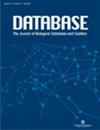STRIDE-DB:探索人类基因组中短串联重复序列不稳定性和表型相关性的综合数据库
IF 3.4
4区 生物学
Q1 MATHEMATICAL & COMPUTATIONAL BIOLOGY
Database: The Journal of Biological Databases and Curation
Pub Date : 2024-04-11
DOI:10.1093/database/baae020
引用次数: 0
摘要
短串联重复序列(STR)是由重复 DNA 序列组成的遗传标记。在法医分析、人口研究和各种神经肌肉疾病的基因检测中,STR 的变异被广泛研究。了解多态 STR 变异及其原因对于破译遗传信息和发现各种疾病的关联至关重要。在本文中,我们介绍了 STRIDE-DB,一个探索 STR 不稳定性及其表型相关性的新颖独特的平台,以及一个全面的人类基因组 STR 数据库。我们利用 RepeatMasker 识别了人类基因组(hg19)中的所有 STR,并将其与来自 1000 基因组计划的频率数据相结合。STRIDE-DB 是一个用户友好型资源,在研究 STR 变异、不稳定性和表型之间的关系方面发挥着关键作用。通过利用来自全基因组关联研究(GWAS)、ClinVar 数据库、Alu 基因位点、基因组中的 Haploblocks 和 STRs 保守性的数据,它成为研究人员探索人类基因组中 STRs 变异及其对表型的直接影响的重要工具。STRIDE-DB 在法医学和其他重复扩增疾病等不同研究领域具有广泛的适用性和重要意义。数据库网址:https://stridedb.igib.res.in.本文章由计算机程序翻译,如有差异,请以英文原文为准。
STRIDE-DB: a comprehensive database for exploration of instability and phenotypic relevance of short tandem repeats in the human genome
Short Tandem Repeats (STRs) are genetic markers made up of repeating DNA sequences. The variations of the STRs are widely studied in forensic analysis, population studies and genetic testing for a variety of neuromuscular disorders. Understanding polymorphic STR variation and its cause is crucial for deciphering genetic information and finding links to various disorders. In this paper, we present STRIDE-DB, a novel and unique platform to explore STR Instability and its Phenotypic Relevance, and a comprehensive database of STRs in the human genome. We utilized RepeatMasker to identify all the STRs in the human genome (hg19) and combined it with frequency data from the 1000 Genomes Project. STRIDE-DB, a user-friendly resource, plays a pivotal role in investigating the relationship between STR variation, instability and phenotype. By harnessing data from genome-wide association studies (GWAS), ClinVar database, Alu loci, Haploblocks in genome and Conservation of the STRs, it serves as an important tool for researchers exploring the variability of STRs in the human genome and its direct impact on phenotypes. STRIDE-DB has its broad applicability and significance in various research domains like forensic sciences and other repeat expansion disorders. Database URL: https://stridedb.igib.res.in.
求助全文
通过发布文献求助,成功后即可免费获取论文全文。
去求助
来源期刊

Database: The Journal of Biological Databases and Curation
MATHEMATICAL & COMPUTATIONAL BIOLOGY-
CiteScore
9.00
自引率
3.40%
发文量
100
审稿时长
>12 weeks
期刊介绍:
Huge volumes of primary data are archived in numerous open-access databases, and with new generation technologies becoming more common in laboratories, large datasets will become even more prevalent. The archiving, curation, analysis and interpretation of all of these data are a challenge. Database development and biocuration are at the forefront of the endeavor to make sense of this mounting deluge of data.
Database: The Journal of Biological Databases and Curation provides an open access platform for the presentation of novel ideas in database research and biocuration, and aims to help strengthen the bridge between database developers, curators, and users.
 求助内容:
求助内容: 应助结果提醒方式:
应助结果提醒方式:


